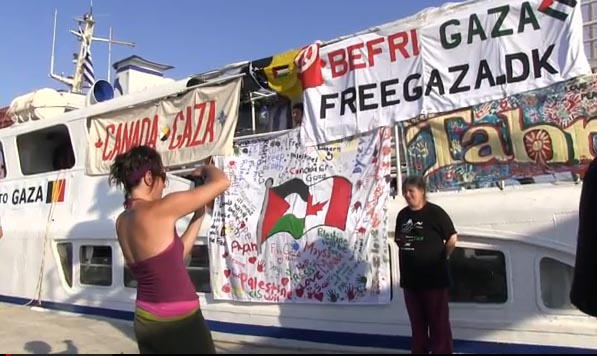Canadian activist Dylan Penner describes what has happened to The Tahrir, its crew, and international activists since it made a dash to leave Greece early Monday.
Cathryn Atkinson: Where are you?
Dylan Penner: At port. I am below deck. The Tahrir has been damaged by the Greek coastguard when they forced us into port. [Editor’s Note: The Tahrir was slammed into a concrete wall — with the boat taking on water and its diesel tank having been damaged, though it is not sinking.] We’re still on board, but essentially what we’ve seen is the very clear expansion of the illegal Israeli blockade of Gaza to Greece.
CA: What is happening currently?
DP: There is a crowd gathered at the port. We’re still here. Most of us are gathering in the main gathering area above deck, and we are about to have some discussions to decide our next steps. Essentially, what happened was we managed to get about 15 minutes out of port, from Agios Nikolaos, which is a port in Crete where we were docked.
We were boarded by the Greek coastguard following the economic blackmail by Israel and Western nations of Greece in the midst of their economic crisis. The coastguard, under ministerial order by the Greek government as a result of all of that, boarded our vessel similarly to how they took control of the U.S. vessel The Audacity of Hope, and have brought it back into port.
CA: Have they tried to arrest your captain, as they did with the captain of The Audacity of Hope?
DP: When they asked who the captain was, we’ve been saying “We are all the captain.” I have to go for now for the meeting.
More to follow: Interview ended 8:50 p.m. local time (1:50 p.m. EST)
Continued: 10 p.m. local time (3 p.m. EST)
CA: So you had a meeting. Tell me about it.
DP: Basically, our understanding from our legal representatives is that there is significant increased likelihood of arrest if we leave the boat, so we are all remaining on the boat right now. There was some damage, it looks like it was not extensive enough to be a safety issue but it is still something we are concerned about, given that there was no right for the Greek authorities to board our boat in the first place.
At the moment, we’re just waiting for further legal advice to assess the damage to the boat and that’s the situation at the moment.
CA: I understand The Tahrir was slammed into a concrete wall. Is that right?
DP: I believe that may have been the cause of the damage. I didn’t witness it myself. It’s hard to fully assess it from on board the boat, but I believe it was something along those lines.
CA: But did you feel an impact?
DP: I didn’t, but there was a lot going on at the time, with soldiers running back and forth and that kind of thing.
CA: Did they have guns trained on you?
DP: There weren’t any that I could see, but there were certainly lots of special forces on board with automatic rifles. One of the coast guard [officers], when he boarded and several of them were stepping over me while I was telling them to get off our boat, had his sidearm pistol drawn.
CA: How many special forces and other Greek authorities boarded The Tahrir?
DP: There was a lot of movement, so I can only estimate, but I think somewhere around 10 special forces and coastguard.
At the moment, we’ve been in discussions with local city counsellors and trade unionists who are on the dock just a couple of feet away from us. They are expressing their solidarity, and are doing what they can to build the necessary solidarity at this point in time.
CA: Are your lawyers local Greek lawyers?
DP: Yes.
CA: They have advised you to stay aboard The Tahrir right now?
DP: For the time being. Until we have further legal advice.
CA: Are they trying to negotiate with the authorities?
DP: Yes, the mayor had gone down to the port authority to negotiate the release of a couple of our Tahrireans, who were still on the ground and currently in detention.
CA: How many are in detention?
DP: Two. From what I understand no one has been charged as yet, but they are in plastic handcuffs and being detained, but otherwise being treated all right.
CA: And they are being kept at the port?
DP: At the port authority from what I understand.
CA: Who are they?
DP: I can’t release their names at the moment.
CA: Why were they arrested?
There was a special part of the action where a couple of our delegates volunteered just before we left, [to get] in kayaks and paddle in front of the coast guard vessel to give us a little extra time to leave port.
CA: It’s after 10 p.m. there. It’s dark now. What is the mood?
DP: Yes….
At this point the connection is disrupted and the interview abruptly ends. Despite repeated attempts to call back, there has been no success.
Cathryn Atkinson is rabble.ca’s news and features editor.



